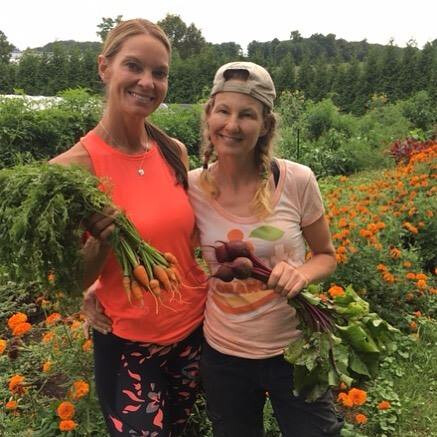Image

The Growing Health Crisis: Why Whole Foods Matter Now More Than Ever and How to Get Them
by Lisa | CSA, Oak Spring Farm
20633 Mount Zion Rd, Freeland, MD
443-605-3063

We’ve all heard it, right? “Eat more whole foods”….not to be confused with the upscale grocer.
But let’s be honest, processed food is everywhere. And fast food? So convenient.
In our busy lives, we crave convenience. It’s just easier to grab take-out than scramble to make dinner after a long day.
I get it.
My kids love Chipotle. And ordering take-out? That can be a huge relief.
But have you noticed how you sometimes feel foggy or bloated after a take-out night? Stick with me here—I’m not saying we need to ban take-out or ditch pizza night. I’m just wondering, how can we make sure we’re eating enough whole foods and getting the right nutrition?
I need this advice too.
Back when my kids were little, I had a pretty solid routine of cooking most nights. Even with chaotic after-school schedules, we managed to sit down for family meals. Now, with everyone’s lives scattered, I find it harder to get motivated for a home-cooked meal.
Maybe you feel the same?
What if we added a big green salad to pizza night? Apple slices for dessert? Carrot and celery stick snack? Small steps like these can shift how we think about “convenience.”
Here’s why it matters: the Standard American Diet (SAD) relies too much on processed foods, and it’s hurting our health.

Get this: over 60% of the average American’s daily calories come from processed foods. Yes, it’s time-saving, but those foods are packed with unhealthy fats, sugars, and preservatives. And they’re often nutrient-poor.
Processed food may be easy, but it’s contributing to weight gain, heart disease, type 2 diabetes, cancer, inflammation and even Alzheimers. Meanwhile, whole foods—things like fruits, veggies, and unprocessed meats—are loaded with the nutrients our bodies need. They support a healthy gut, keep us full longer, and help us feel better overall.
I know we’re all busy. I know take-out is tempting. So, how can we find balance?
1. Join a CSA
A CSA (Community Supported Agriculture) gives you a regular supply of fresh, whole foods right in your fridge. When you have those ingredients at your fingertips, it’s easier to choose them over-processed stuff. Plus, supporting local farmers feels good.
2. Cook More & Sit Down for Family Meals
When you cook at home, you control what goes into your meals. Even if it’s just a few times a week, sitting down with family helps establish healthier habits. And it’s not just about food—it’s about connection.
3. Meal Prep & Plan a Night Off
Prepping snacks or meals ahead of time makes it easier to grab something healthy when life gets busy. And hey, allow yourself a take-out night! The key is balance—enjoy your meals and don’t feel guilty.
We’re all in this together. It’s a ripple effect. Let’s aim for more whole foods in our diets and enjoy the benefits—one bite at a time.
Progress, not perfection my friends.

“Processed foods undergo deliberate alterations from their natural state for various reasons, including preservation, flavor enhancement, or convenience. These changes can involve the addition of sugar, salt, unhealthy fats, artificial flavors, and preservatives. In contrast, whole foods are in their natural or minimally processed state, providing essential nutrients without excessive additives.”
“Today, the average American consumption of processed food is around 63%, resulting in the continual deterioration of health in the U.S. Processed foods are calorie-dense but nutrient-poor, contributing to weight gain, cardiovascular disease, type 2 diabetes, cancer, and chronic inflammation. Whole foods, on the other hand, stand out for their nutrient density, fiber, and antioxidants, supporting overall health, satiety, and a healthy gut microbiome.”
Alongside this rise in processed food consumption, we’re seeing a growing problem with vitamin and nutrient deficiencies. Despite living in a society where food is abundant, many people are unknowingly lacking key nutrients like potassium and magnesium, which are critical for our brain function, energy, and overall well-being.
– Potassium plays a vital role in heart health and blood pressure regulation, yet many Americans don’t get nearly enough of it.
– Magnesium is essential for muscle function, energy production, and even mood stabilization, but deficiency is increasingly common in children and adults.
Without these critical nutrients, our bodies are more prone to chronic diseases, fatigue, and mental health challenges.
Some whole foods abundant at Oak Spring right now are poblano peppers and tomatillos
Find new inspiration from our recipes.
Click here to check out Chicken Chili Verde, a whole food, main meal delight.
We can all feel better and live longer ONE MEAL AT A TIME
i know the struggle is real. That’s why none of us have to do it alone.
eat well, be well.